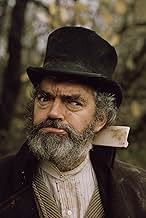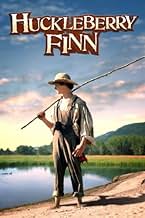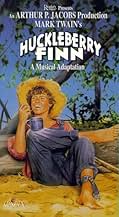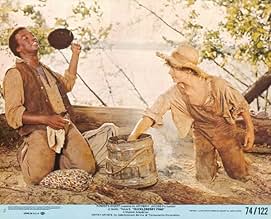अपनी भाषा में प्लॉट जोड़ेंIn 1840s Missouri, young Huckleberry Finn, wanting to escape his violent drunkard father, joins Black runaway slave Jim on a quest for freedom down the Mississippi River on a raft.In 1840s Missouri, young Huckleberry Finn, wanting to escape his violent drunkard father, joins Black runaway slave Jim on a quest for freedom down the Mississippi River on a raft.In 1840s Missouri, young Huckleberry Finn, wanting to escape his violent drunkard father, joins Black runaway slave Jim on a quest for freedom down the Mississippi River on a raft.
- निर्देशक
- लेखक
- स्टार
फ़ीचर्ड समीक्षाएं
Mark Twain purists might take issue with the changes made in the story of the
classic Huckleberry Finn. But I rather like the approach that was taken here and also the performance of Jeff East in the title role.
This was East's second film, he debuted the previous year in Tom Sawyer also playing Huck Finn. Later on he would be young Clark Kent in the blockbuster Superman film.
Harvey Korman and David Wayne are nothing short of brilliant as those two rogues the 'king' and the 'duke'. Both look like they are having a great old time. Gary Merrill is superb as Huck Finn's white trash Pap.
In this post civil rights era film particular emphasis is placed on Huck's relationship with runaway slave Jim with whom he shares that raft on the Mississppi. The optimism of Twain's work stems from the white trash background that Huck has, but that how he thinks and reasons and generally tries to rise above it. Some very good scenes are shared with East and with Paul Winfield as Jim.
The Sherman Brothers musical score is serviceable for the film, but nothing outstanding. The sets and cinematography really do convey life in the ante bellum souh and border states.
You can't go wrong with this adaption of Huckleberry Finn.
This was East's second film, he debuted the previous year in Tom Sawyer also playing Huck Finn. Later on he would be young Clark Kent in the blockbuster Superman film.
Harvey Korman and David Wayne are nothing short of brilliant as those two rogues the 'king' and the 'duke'. Both look like they are having a great old time. Gary Merrill is superb as Huck Finn's white trash Pap.
In this post civil rights era film particular emphasis is placed on Huck's relationship with runaway slave Jim with whom he shares that raft on the Mississppi. The optimism of Twain's work stems from the white trash background that Huck has, but that how he thinks and reasons and generally tries to rise above it. Some very good scenes are shared with East and with Paul Winfield as Jim.
The Sherman Brothers musical score is serviceable for the film, but nothing outstanding. The sets and cinematography really do convey life in the ante bellum souh and border states.
You can't go wrong with this adaption of Huckleberry Finn.
Lovers of Huckleberry Finn might cringe at the liberties taken in this film, particularly at the end. The end that Twain wrote for the book wasn't very strong, with Tom Sawyer returning and making a muck of things. This is not the only version of Huck Finn that tries an alternate ending.
As a musical, this film does not work. The numbers are awkwardly placed and spaced, and some of the actors are unsure of their singing altogether. The songs in the companion film Tom Sawyer work better because they are usually sung as a voiceover, serving as an internal dialogue.
Another basic problem with this adaptation is that some of the most interesting events in the story take place offscreen. You only hear them described afterwards, which is a very weak storytelling device.
But oh, the memories! I saw this film when I was in my early teens, and I immediately fell for the young actor Jeff East in the title role. It was a great movie in my opinion back then, so as a recommendation to youngsters and pre-teenage girls, I can't do better now!
As a musical, this film does not work. The numbers are awkwardly placed and spaced, and some of the actors are unsure of their singing altogether. The songs in the companion film Tom Sawyer work better because they are usually sung as a voiceover, serving as an internal dialogue.
Another basic problem with this adaptation is that some of the most interesting events in the story take place offscreen. You only hear them described afterwards, which is a very weak storytelling device.
But oh, the memories! I saw this film when I was in my early teens, and I immediately fell for the young actor Jeff East in the title role. It was a great movie in my opinion back then, so as a recommendation to youngsters and pre-teenage girls, I can't do better now!
Huge Mark Twain fan. In my opinion this is the very best production of Huckleberry Finn. Great choreography, costumes, and sets. It does have a musical element but it doesn't detract from the production but instead complements it. The movie does not have a juvenile feel to it and could be enjoyed by the entire family but with parental discretion as this deeper cultural issues are explored. If you enjoy this movie you should check out Tom Sawyer. It features cast reprisals and is a bit more lighthearted. Enjoy.
Talented filmmaker J. Lee Thompson stages this musical version of Mark Twain's "The Adventures of Huckleberry Finn" with artificial verve, and nothing in it looks quite right or plays at the appropriate tempo. Stolen from his guardians by his delinquent father, Huckleberry Finn stages his own death and hits the Mississippi River with friend Jim the Slave (why the two don't return to the sisters whom Jim works for is never made clear--both he and Huckleberry would certainly benefit from their generosity). Songwriters Richard and Robert Sherman, who also adapted the screenplay, seemed to lose their way musically once their mentor, Walt Disney, died; here, their songs are like leaden chapter stops in the narrative, not that the actors have much musical range. Teen star Jeff East doesn't even have music in his speaking voice, and he crawls through the picture lethargically, talking through his nose as if he had a cold. Paul Winfield fares better as Jim, though this pictorial, phony journey must have seemed quite a comedown after his "Sounder". Cinematographer László Kovács gets some beautiful shots of the raft on the water, but the limp direction and editing makes nearly all of Kovács' compositions look poorly framed. The color schemes are gloppy, with day scenes appearing as dusk and vice-versa. Director Thompson, who makes the white folks look like doddering scoundrels and the black folks look like grinning simpletons, can't work up a cohesive pace for the picture, and it jostles about from one poor vignette to the next. This was a follow-up by financiers Reader's Digest to 1973's "Tom Sawyer"; as with that film, a TV-version was right on their heels, in this case 1975's "Huckleberry Finn" starring Ron Howard and Donny Most. * from ****
A forgotten relic from the early '70s, when shows like "Little House on the Prairie" and "The Waltons" all reflected our yearning for a so-called simpler, less complicated era. This adaptation, while not entirely faithful to the book, captures its essential themes and spirit rather well. There are some technical problems (the lighting always seem to be half in shadow, whether it's night or day!) and its kiddie-friendly tone seems at odds during the Grangerfords/Shepherdsons sequence, wherein we see men being shot and killed right on camera--and it's handled rather lightly. Parents should also be warned that this adaptation does have some strong language--it has not been sanitized, notwithstanding its G rating.
In addition, the musical format sits much more uneasily with this movie than with the superior "Tom Sawyer" (from the year before, with many of the same cast members and production staff). However, as oddly as some numbers come off, others are wonderful, such as the clever, dixie-ish "Cairo, Illinois," a duet between Huck and Jim that kicks off their great journey together. The jaunty title song and the lovely anthem "Freedom" also showcase the movie and its themes beautifully--especially during "Freedom"'s reprise, as Huck, the boy/man run away, gazes after Jim making his way downriver. Performances are generally strong--Jeff East could've been a better singer but his performance is so sincere and authentic, you hardly notice. Likewise his bond with Jim (well-portrayed by the late Paul Winfield) comes through nicely, most especially in their final, very moving scene together. Harvey Korman and David Wayne also deliver terrific turns as the King and the Duke, respectively.
Cinematography is *gorgeous*--the DP took full advantage of the location shoot, with some beautiful silhouette shots. Although its prequel is far better (you simply cannot top "Tom Sawyer"'s terrific score and thoroughbred cast), Mark Twain's quintessential Great American novel is reasonably well-served here, if not transcendently.
In addition, the musical format sits much more uneasily with this movie than with the superior "Tom Sawyer" (from the year before, with many of the same cast members and production staff). However, as oddly as some numbers come off, others are wonderful, such as the clever, dixie-ish "Cairo, Illinois," a duet between Huck and Jim that kicks off their great journey together. The jaunty title song and the lovely anthem "Freedom" also showcase the movie and its themes beautifully--especially during "Freedom"'s reprise, as Huck, the boy/man run away, gazes after Jim making his way downriver. Performances are generally strong--Jeff East could've been a better singer but his performance is so sincere and authentic, you hardly notice. Likewise his bond with Jim (well-portrayed by the late Paul Winfield) comes through nicely, most especially in their final, very moving scene together. Harvey Korman and David Wayne also deliver terrific turns as the King and the Duke, respectively.
Cinematography is *gorgeous*--the DP took full advantage of the location shoot, with some beautiful silhouette shots. Although its prequel is far better (you simply cannot top "Tom Sawyer"'s terrific score and thoroughbred cast), Mark Twain's quintessential Great American novel is reasonably well-served here, if not transcendently.
क्या आपको पता है
- ट्रिवियाThis was the first musicalization of Huckleberry Finn. The next one happened 10 years later in 1985, on Broadway; it was "Big River." a hit show which ran for several years and won seven Tonys, including Best Musical.
- भाव
Huckleberry Finn: I don't give a damn what the whole world says, 'cause if I'm doin' wrong--well--well, I hope I roast in hell forever.
- कनेक्शनFollows Tom Sawyer (1973)
टॉप पसंद
रेटिंग देने के लिए साइन-इन करें और वैयक्तिकृत सुझावों के लिए वॉचलिस्ट करें
- How long is Huckleberry Finn?Alexa द्वारा संचालित
विवरण
- रिलीज़ की तारीख़
- कंट्री ऑफ़ ओरिजिन
- आधिकारिक साइट
- भाषा
- इस रूप में भी जाना जाता है
- Mark Twain's Huckleberry Finn: A Musical Adaptation
- फ़िल्माने की जगहें
- उत्पादन कंपनियां
- IMDbPro पर और कंपनी क्रेडिट देखें
बॉक्स ऑफ़िस
- बजट
- $30,00,000(अनुमानित)
- चलने की अवधि
- 1 घं 58 मि(118 min)
- रंग
- पक्ष अनुपात
- 2.35 : 1
इस पेज में योगदान दें
किसी बदलाव का सुझाव दें या अनुपलब्ध कॉन्टेंट जोड़ें






























